Peer-Reviewed Articles in English by Bengi Akbulut
Journal of Australian Political Economy, 2021
Building on extensive fieldwork in Turkey, we develop the concept of accumulation by dislocation ... more Building on extensive fieldwork in Turkey, we develop the concept of accumulation by dislocation to elucidate the particular regime of accumulation that took shape under authoritarian neoliberalism in Turkey, distinct in the interlinked flows of resources, capital and labor that it mobilizes. We operationalize the notion to demonstrate how the Turkish state orchestrates both the production of labor and capital as such, and their incorporation into circuits of accumulation, which intimates a particular form of developmentalism.
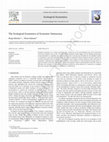
Ecological Economics, 2020
Ecological economics is at a sharp crossroads today, mostly due to the unprecedented scale of the... more Ecological economics is at a sharp crossroads today, mostly due to the unprecedented scale of the intertwined social and ecological crises we face. We argue that the discipline should engage with the thinking and practices around alternatives to capitalism more substantially, as this is essential and invaluable for the discipline's ability to contribute to a just and sustainable future. We outline an agenda for future ecological economics research on economic alternatives that are shaped by the concrete ways in which economic democracy deals with issues of uncertainty, complexity and value incommensurability, and contribute to a kind of political economy that ecological economics would advocate. We lay out how this question could be operationalised within the context of allocation and exchange (i.e. alternatives to market), production and investment (i.e. alternatives to capitalist Trm) and economic subjectivities (i.e. alternatives to self-interest).
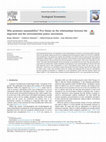
Environmental destructions, overconsumption and overdevelopment are felt by an increasing number ... more Environmental destructions, overconsumption and overdevelopment are felt by an increasing number of people. Voices for 'prosperity without growth' have strengthened and environmental conflicts are on the rise worldwide. This introduction to the special issue explores the possibility of an alliance between post-growth and ecological distribution conflicts (EDCs). It argues that among the various branches of post-growth and EDCs, degrowth and environmental justice (EJ) movements have the best potential to interconnect. This claim is discussed via five 'theses': We argue that both degrowth and EJ movements are materialist but also more than just materialist in scope (thesis I) and both seek a politico-metabolic reconfiguration of our economies (thesis II). We also show that both degrowth and EJ seek consequential as well as deontological justice (thesis III) and they are complementary: while EJ has not developed a unified and broader theoretical roadmap, degrowth has largely failed to connect with a wider social movement (thesis IV). Finally, both degrowth and EJ stress the contradiction between capitalist accumulation vs. conditions of social reproduction (rather than that between capital and labour) (thesis V). We conclude that an alliance between degrowth and EJ is not only possible but necessary.
https://www.sciencedirect.com/science/article/pii/S0921800919306160?dgcid=author#s0045
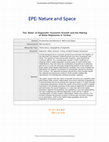
Critical perspectives on economic growth have laid bare the fragility of the assumed link between... more Critical perspectives on economic growth have laid bare the fragility of the assumed link between material growth and socio-ecological well- being. The appeal of economic growth, however, goes beyond the economic sphere. As a societal goal, growth is often mobilized to preempt and/or coopt opposition around issues of social justice and redistribution. Not only does the constitution of growth as a collective goal serve to unite the internally-fragmented sphere of the social and brush aside (class-based) distributional conflicts, but it also enables the distribution of material concessions to subordinate classes for eliciting their consent. The degrowth proposal should thus more broadly tackle the material and discoursive ways in which growth enables the reproduction of contemporary political-economic systems.
This paper argues that the notion of growth functions as a powerful ideal that shapes state-society relationships and social-collective imaginations. It demonstrates this by discussing the making of state in Turkey through a Gramscian perspective, where the notion of economic growth is deeply imprinted in the broader practices of the state to legitimize its existence and dominates the social imaginary in a way that cannot be easily dismissed. Against this backdrop, the possibility of not only effectuating, but also imagining and desiring degrowth would call for a radical reconfiguration of state-society relationships. Within this context, The Kurdish Freedom Movement’s project of Democratic Economy emerges as an alternative, both to the nation-state paradigm and to the imperative of economic growth.
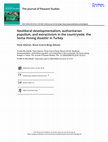
Journal of Peasant Studies, 2018
While state-society relations in Turkey have historically been top-down and coups d'état periodic... more While state-society relations in Turkey have historically been top-down and coups d'état periodically interrupted democratic politics, the recent authoritarian turn under Erdoğan is remarkable. Two dynamics are especially salient. First, Erdoğan and his AKP have been particularly effective in deepening the neoliberalisation of economy and society. Their policies have created a new form of neoliberal developmentalism, where solutions to all social ills have come to be seen as possible through rapid economic growth. Second, they have intensified the transformation of the countryside, where new forms of dispossession and deagrarianisation open the way to an unprecedented extractivist drive. Together, neoliberal developmentalism and extractivism have resulted in growing social dissent. The eruption of anger after the Soma coal mining disaster that killed 301 miners is one such case. The paper shows how Erdoğan and the AKP use populist tactics (ranging from an uptick in nationalist discourse to the provision of 'coal aid' in winter) to assuage their critics. Where these prove inadequate, an increasingly violent crackdown on social dissent is being deployed in the name of peace and order as the country remains in a state of emergency since the attempted coup of July 2016.

Development and Change, Jul 14, 2015
This paper offers a reading of contemporary mainstream development economics as an overdetermined... more This paper offers a reading of contemporary mainstream development economics as an overdetermined product of transformations internal to the discipline of economics (i.e., the late neoclassical turn within contemporary mainstream economic theory), transformations within the institutional-discursive matrix of development (i.e., the transition from growth-centered policies to poverty-alleviation and good-governance oriented policies), and a broader transition from post- war Keynesian developmentalism (with its variants in the second and third worlds) to actually existing varieties of neoliberal governmentality. Within this constellation, we claim that, while mainstream development economics has been gradually decimated into micro-level impact appraisal studies of developmental projects (the so-called ‘randomization approach’), the broader macro-economic questions are displaced from the field to the purview of methodologically individualist, late neoclassical analyses of institutions and growth (the so-called ‘new institutionalism’).
Proliferation of environmental movements, both in number and in geographical-spatial scope, has c... more Proliferation of environmental movements, both in number and in geographical-spatial scope, has certainly been one of the markers of contemporary times. The analytical frameworks within which the wealth of issues posed by contemporary environmental movements are to be addressed, however, have largely lagged behind. This paper problematizes, in particular, the ability of the existing literature to accurately capture the underlying motivations of environmental movements. It illustrates, by utilizing a case study of a resistance against a coal plant in Gerze, Turkey, that a type of environmental activism that cannot be explained by livelihood concerns or post-materialist values is emerging and becoming increasingly common.
Journal of Peasant Studies

Development and Change, Jan 1, 2012
The current discourse and practice of natural resource management rest on the assumption that par... more The current discourse and practice of natural resource management rest on the assumption that participatory decision-making mechanisms offer efficient and equitable policy solutions. There is increasing recognition, however, that such mechanisms might fail in ensuring effective participation of all stakeholders and, consequently, be prone to (re)producing inequalities and remaining ineffective in environmental protection. Taking this observation as a backdrop, this study addresses the under-investigated implications of state-society relationships on the operation of participatory processes. By employing a unique combination of data provided by focus groups, in-depth interviews, and a survey administered to 377 individuals, it analyses the 'failure' of participatory decision making within the context of an internationallyfunded environmental conservation project in Sultan Sazlıgı, Turkey. The article argues that the specific manifestations of state-society relationships and the political economy dynamics at the local level account for this failure. It shows that local materializations of state behaviour, interacting with local inequalities and perceptions of the decision-making process, impinge on effective participation. In emphasizing that the capability of different groups to participate is shaped by the state in important ways, this article calls for more research on the political economy of state-society relationships and community-based resource management.
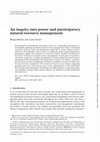
Cambridge Journal of Economics, Jan 1, 2012
Decentralised environmental governance based on community participation is increasingly replacing... more Decentralised environmental governance based on community participation is increasingly replacing top-down natural resource management. There is increasing awareness, however, that such mechanisms might fail to ensure effective participation by all stakeholders and be prone to producing and/or perpetuating power inequalities. Against this backdrop, we claim that 'power' should be positioned at the centre of analyses of natural resource management. In this paper we provide a taxonomy of positions to analyse participatory decision making in natural resource management. We operationalise this framework to analyse two 'failures' of participatory natural resource management in Turkey, focusing on reasons for failure and the role of power asymmetries. Our results are based on case studies comprising in-depth interviews, focus groups and a survey administered to 944 individuals. We conclude that participatory mechanisms are highly unlikely to bring democratic and equitable outcomes unless power relations are addressed at both institutional and local levels.
Book Chapters in English by Bengi Akbulut
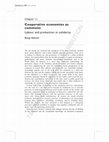
Commoning the City: Empirical Perspectives on Urban Ecology, Economics and Ethics, 2020
The recent years have witnessed the resurgence of the notion of the commons. In particular, the n... more The recent years have witnessed the resurgence of the notion of the commons. In particular, the notion of the commons and analyical concepts surrounding it are being operationalized in a way that moves beyond the term’s traditional use – that often denotes physical or immaterial entities such as shared natural resources, urban space or cultural knowledge— to describe processes of organizing social (re)production outside of the state and the market based on principles of democracy, collectivity and solidarity. There has been, however, relatively little dialogue between this understanding of the commons and the accumulated knowledge on solidarity economies. This chapter/article traces how the framework of the commons and commoning can contribute to debates around solidarity economies, i.e. forms of organizing processes of (re)production, exchange and consumption in egalitarian, collective and democratic ways. It does so by elaborating on how such forms of economic organizing entails different forms of commoning, and by drawing on the concrete examples of solidarity economies in Istanbul. It will particularly focus on how different forms of solidarity economies, by organizing the economic sphere differently, animate a commoning of labor, space and of knowledge.
This chapter focuses on a comparison of state-built large dams and small-scale hydropower plants ... more This chapter focuses on a comparison of state-built large dams and small-scale hydropower plants (HPPs) constructed by private firms in Turkey, by situating them within the broader historical dynamic between state and society via the Gramscian concept of hegemony. It argues that while dams could animate modernisation and development as collective interest on which the Turkish state’s hegemonic project was built on, HPPs failed to do so and thus were widely opposed. The argument is illustrated by findings from an extensive field study conducted in Artvin, a province in the north-eastern corner of Anatolia.
Urban Forests, Trees, and Green Space: A Political Ecology Perspective, 2014
Articles in English by Bengi Akbulut
The more a country consumes electricity, the stronger it is, the faster it advances in the path o... more The more a country consumes electricity, the stronger it is, the faster it advances in the path of development. It means that the wheels in the factories are turning, that production in our enterprises are rising, that its consumption in the households are increasing, that technology use is spreading in the entire country (…) In the advanced, developed countries of the world large shortages [of energy] have been compensated and [energy] issues were solved by controlled and rational steps. God willing, we will solve this issue as well (…) This is why we are taking a new step; we are replacing the phrase "water flows, the Turk just watches" with "water flows, the Turk acts", and God willing, we are compensating for this shortage. 1
Amartya Sen demonstrates that although women are normally expected to outnumber men by a ratio of... more Amartya Sen demonstrates that although women are normally expected to outnumber men by a ratio of approximately 1.05 to 1, they in fact suffer from unequal access to medical care, food and social services. Thus, fewer women survive. Estimating what the size of the female population would be if these inequalities did not exist and 1.05:1 ratio prevailed globally, he concludes that the world population is short of more than 100 million women.
The construction business, which proved to be one of the principal sectors of AKP period developm... more The construction business, which proved to be one of the principal sectors of AKP period development strategy, has not only hit the rural areas but also historical and central neighborhoods of metropolitan cities. One of the gentrification attempts which paved the way for rant for the construction business, displaced people and demolished the social fabric through social engineering, is the "Tarlabaşı 360" project, which was accomplished by the Beyoğlu Municipality despite all opposition.. Foto:
Articles in Turkish by Bengi Akbulut

Uploads
Peer-Reviewed Articles in English by Bengi Akbulut
https://www.sciencedirect.com/science/article/pii/S0921800919306160?dgcid=author#s0045
This paper argues that the notion of growth functions as a powerful ideal that shapes state-society relationships and social-collective imaginations. It demonstrates this by discussing the making of state in Turkey through a Gramscian perspective, where the notion of economic growth is deeply imprinted in the broader practices of the state to legitimize its existence and dominates the social imaginary in a way that cannot be easily dismissed. Against this backdrop, the possibility of not only effectuating, but also imagining and desiring degrowth would call for a radical reconfiguration of state-society relationships. Within this context, The Kurdish Freedom Movement’s project of Democratic Economy emerges as an alternative, both to the nation-state paradigm and to the imperative of economic growth.
Book Chapters in English by Bengi Akbulut
Articles in English by Bengi Akbulut
Articles in Turkish by Bengi Akbulut
https://www.sciencedirect.com/science/article/pii/S0921800919306160?dgcid=author#s0045
This paper argues that the notion of growth functions as a powerful ideal that shapes state-society relationships and social-collective imaginations. It demonstrates this by discussing the making of state in Turkey through a Gramscian perspective, where the notion of economic growth is deeply imprinted in the broader practices of the state to legitimize its existence and dominates the social imaginary in a way that cannot be easily dismissed. Against this backdrop, the possibility of not only effectuating, but also imagining and desiring degrowth would call for a radical reconfiguration of state-society relationships. Within this context, The Kurdish Freedom Movement’s project of Democratic Economy emerges as an alternative, both to the nation-state paradigm and to the imperative of economic growth.
bu yazının bir arka plan olarak değerli olduğunu düşünüyoruz.
Üç Ekoloji’nin 10. yılı geride kalırken toplumsal hareketler tarihinde çok önemli bir dönüm noktası olan Gezi direnişi hakkında yayınladığımız bu ilk özel sayımızın, arşivlenecek bir sayı olacağını umuyoruz.
Müşterekler kuramından müşterekleşme pratiklerine, özel bir örnek olan Caferağa Dayanışmasından siyaset ve planlama ile ilişkisinin nasıl kurulabileceğine keyifli bir tartışma yaptık.
Gelgelelim dünyada “müşterekler” kavramının tarihsel olarak izlediği seyri ve kavram etrafında gelişen tartışmaları daha iyi anlayabilmeyi sağlayacak literatürün önemli bir kısmı dilimize çevrilmiş değildi. Literatürde en çok tartışma ve itiraz konusu olmuş Hardin’in “Müştereklerin Trajedisi” yazısı, müşterekler hakkında geliştirdiği kavramsal çerçeve sayesinde Nobel ödülü kazanmış Ostrom’un “Müşterekleri Yeniden Tanımlamak” metni ve alanın en önemli kuramcılarından “otonomist” De Angelis’in metinleri gibi kurucu metinleri içeren elinizdeki derleme bu eksikliği giderme yolunda atılmış bir adım. Kitapta bu kurucu metinlerin yanı sıra su müşterekleri, kentsel müşterekler ve müştereklerden yola çıkan toplumsal hareketleri dünyadaki ve Türkiye’deki çeşitli örnekler üzerinden tartışma konusu yapan önemli yazılar da bir araya getiriliyor.
Hem müştereklere dair farklı kavramsal çerçeveleri eleştirel ve karşılaştırmalı bir yöntemle tartışmayı, hem de ekonomi-politiğin güncel meselelerine bu çerçevelerin ne tür açılımlar getirdiğini yorumlamayı amaçlayan bu derleme, sadece “alandaki” aktivistlere değil, teorik ve pratik olarak siyasetle ve muhalefet imkânlarıyla ilgilenen herkese hitap ediyor.
İÇİNDEKİLER
Önsöz
Giriş:
Müşterekler: Çatışkılar, Hatlar, İmkânlar
Fikret Adaman, Bengi Akbulut ve Umut Kocagöz
Müştereklerin Trajedisi
Garrett Hardin
Müştereklerin Trajedisi Miti
Ian Angus
Müşterekleri Yeniden Tanımlamak
Elinor Ostrom
İlk Birikim, Mülksüzleştirerek Birikim
ve “Ekonomi-dışı Araçlarla Birikim”
Jim Glassman
Müşterekler
Massimo De Angelis ve David Harvie
Kapitalizme Karşı ve Kapitalizmin Ötesinde Müşterekler
George Caffentzis ve Silvia Federici
Komünizmde Müşterek Olan
Michael Hardt
“Meta”ya Karşı “Müşterekler”:
Küresel Güney’de Alternatif Küreselleşme, Özelleştirme
Karşıtlığı ve Suyun İnsan Hakkı Olarak Tanınması
Karen Bakker
Su Bizim Ulan!
Bolivya’da Suyun Müşterekleştirilmesi
Alexander Dwinell ve Marcela Olivera
Kentsel Müşterekler
Vinay Gidwani ve Amita Baviskar
Kent Müştereğini Aramak:
Mekânsal Adalet Tartışmasına Bir Katkı
Paul Chatterton
Çitleme, Ortak Kullanım Hakkı ve Yoksulun Mülkiyeti
Nicholas Blomley
Brezilya Kent Hareketleri:
Kenti Müşterek olarak “Yeniden-İcat Etmek”
Stavros Stavrides
Krizler, Hareketler ve Müşterekler
Massimo De Angelis
Sonuç:
Bugün Burada: Savunudan İnşaaya Müşterekler
Bengi Akbulut
Katkılar
Kaynakça